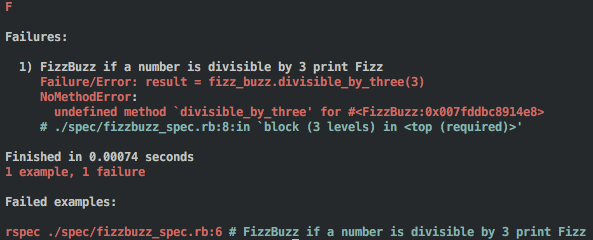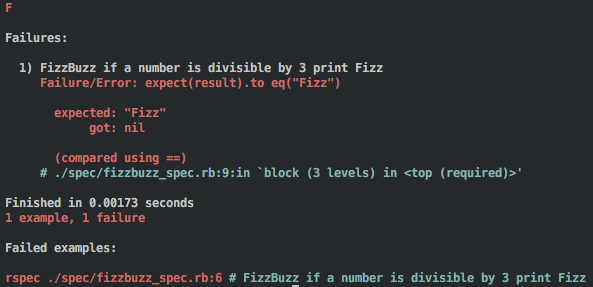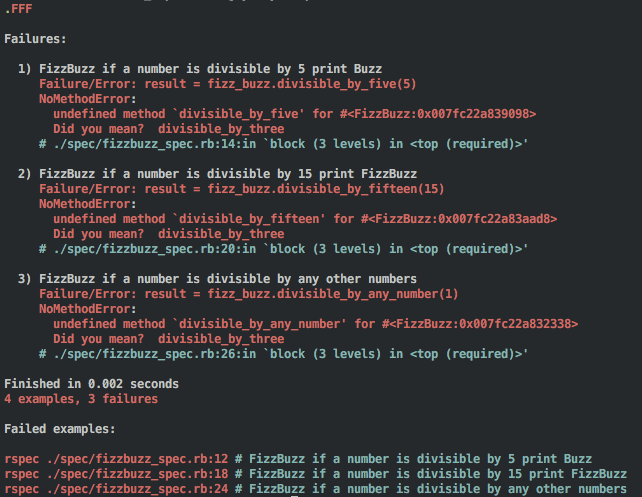Part 2 | FizzBuzz TDD
In this part of the FizzBuzz series I will go over my experience of doing a test-driven development of FizzBuzz.

Following from Part 1 of FizzBuzz which I wrote in plain English, I now want to move onto writing the actual program that will meet the following conditions I have set out. I will be following the Test Driven Development (TDD) process to help me in writing executable and refactored code.
Here is what TDD is in my own words:
-
Write a test case before the actual code as this drives towards writing better code or code that you actually need
-
Run the tests and see it fail since you haven’t implemented the code yet but this shows that the test is working
-
Then write the code and implement it
-
The tests should render successful if the code has met all the conditions/requirements
-
The code must be cleaned up (refactored) throughout testing and implementation stage to make sure it is readable and it is not repeated - the test made before is there to check that the code is still working even after refactoring
As I will be writing the code in pure Ruby, I will be using RSpec, the testing tool for Ruby.
Setting Up
First the RSpec gem has to be installed:
$ gem install rspecThen make a new project directory with lib, spec directories which should have the program and spec file inside respectively.
FizzBuzz_rspec
\_____lib
\_____fizzbuzz.rb
\_____spec
\_____fizzbuzz_spec.rb
\_____spec_helper.rb
\_____GemfileAlternatively you can also do the following command to set up the spec directory:
$ rspec init
or
$ rspec --initCreate a Gemfile with the following:
source "https://rubygems.org"
gem "rspec"Then run the following command in the project directory to install the rspec gem and all its dependencies:
$ bundle installIn the fizzbuzz_spec.rb file we want to input the following code:
describe FizzBuzz do
endThen when we run the RSpec command which checks our tests with corresponding code/program/method:
$ rspecThe error will be as follows:
fizzbuzz_rspec/spec/fizzbuzz_spec.rb:3:in `<top (required)>': uninitialized constant FizzBuzz (NameError)This is because we do not yet have a class method called FizzBuzz yet. In fizzbuzz.rb file we need to input:
class FizzBuzz do
endRequire this in our fizzbuzz_spec.rb file:
require 'FizzBuzz'
describe FizzBuzz do
endNow when we run RSpec, we get:
No examples found.
Finished in 0.00006 seconds
0 examples, 0 failuresThis means that the files are now linked and we can start doing our first test.
Extra notes: You can also add the spec_helper.rb file (or it has already been added when you did rspec init command) in your spec directory to configure your command line output:
RSpec.configure do |config|
config.color = true
endThis will include colours in your terminal. There are other configurations which can be found at RSpec.
Testing and Coding
The first test I will be writing is to meet the conditions of printing out Fizz when a number is divisible by 3:
require 'FizzBuzz'
describe FizzBuzz do
context 'if a number is divisible by' do
it '3 print Fizz' do
fizz_buzz = FizzBuzz.new
result = fizz_buzz.divisible_by_three(3)
expect(result).to eq("Fizz")
end
end
endRunning Rspec:

You can see that divisible_by_three method is not defined yet. Therefore we go back into our fizzbuzz.rb file to define this method:
class FizzBuzz
def divisible_by_three(number)
end
endRunning RSpec:

Now RSpec tells us that the expected was “Fizz” however we actually got nil. This is because our method did not return anything. We can now go on to include Fizz into our method:
class FizzBuzz
def divisible_by_three(number)
"Fizz"
end
endRunning RSpec:

This means our test has now passed!
But of course we know that we don’t just simply want any number to be “Fizz” and it is just for numbers that are divisible by 3. As the test is working up to this point, we can go ahead to write the method and see whether the test is still passing:
class FizzBuzz
def divisible_by_three(number)
if number % 3 == 0
"Fizz"
else
number
end
end
end
The test has passed! Hooray!
Now we can go ahead to write up the tests for our other conditions:
require 'FizzBuzz'
require 'spec_helper'
describe FizzBuzz do
context 'if a number is divisible by' do
it '3 print Fizz' do
fizz_buzz = FizzBuzz.new
result = fizz_buzz.divisible_by_three(3)
expect(result).to eq("Fizz")
end
it '5 print Buzz' do
fizz_buzz = FizzBuzz.new
result = fizz_buzz.divisible_by_five(5)
expect(result).to eq("Buzz")
end
it '15 print FizzBuzz' do
fizz_buzz = FizzBuzz.new
result = fizz_buzz.divisible_by_fifteen(15)
expect(result).to eq("FizzBuzz")
end
it 'any other numbers' do
fizz_buzz = FizzBuzz.new
result = fizz_buzz.divisible_by_any_number(1)
expect(result).to eq(1)
end
end
endRunning RSpec

As expected, the three new methods we tested are not yet defined in our code. We can go ahead and write them up in our fizzbuzz.rb file:
class FizzBuzz
def divisible_by_three(number)
if number % 3 == 0
"Fizz"
else
number
end
end
def divisible_by_five(number)
if number % 5 == 0
"Buzz"
else
number
end
end
def divisible_by_fifteen(number)
if number % 15 == 0
"FizzBuzz"
else
number
end
end
def divisible_by_any_number(number)
number
end
endYou should usually do the following steps based on failed tests:
-
Undefined method - go and define the method
-
Method returned “nil” - input what you expected in your test
-
Test passed-go ahead and define the next method
As the other methods were pretty much the same I knew it would work but you should follow it step by step as the failed tests in a way guide you to write the next bit of code.

You can now see that all tests have passed!
Refactoring
Although these tests and code work, it’s not following the principles of DRY (Don’t Repeat Yourself). There are actually a lot of repetitions in this current code therefore we will be refactoring (restructuring/cleaning up the code) it.
In the spec file, I am repeating the instance variable fizz_buzz = FizzBuzz.new in all of my tests therefore I can actually refactor this into one line like so:
require 'FizzBuzz'
require 'spec_helper'
describe FizzBuzz do
context 'if a number is divisible by' do
let(:fizz_buzz) { FizzBuzz.new }
it '3 print Fizz' do
result = fizz_buzz.divisible_by_three(3)
expect(result).to eq("Fizz")
end
it '5 print Buzz' do
result = fizz_buzz.divisible_by_five(5)
expect(result).to eq("Buzz")
end
it '15 print FizzBuzz' do
result = fizz_buzz.divisible_by_fifteen(15)
expect(result).to eq("FizzBuzz")
end
it 'any other numbers' do
result = fizz_buzz.divisible_by_any_number(1)
expect(result).to eq(1)
end
end
endAfter running RSpec the test still passes!
Now we can start to refactor our code. Instead of defining a method for each method, I can define one and use control flow.
class FizzBuzz
def divisible_by(number)
if number % 15 == 0
"FizzBuzz"
elsif number % 3 == 0
"Fizz"
elsif number % 5 == 0
"Buzz"
else
number
end
end
endSince I changed the method name, this also needs to reflect in my spec file:
require 'FizzBuzz'
require 'spec_helper'
describe FizzBuzz do
context 'if a number is divisible by' do
let(:fizz_buzz) { FizzBuzz.new }
it '3 print Fizz' do
result = fizz_buzz.divisible_by(3)
expect(result).to eq("Fizz")
end
it '5 print Buzz' do
result = fizz_buzz.divisible_by(5)
expect(result).to eq("Buzz")
end
it '15 print FizzBuzz' do
result = fizz_buzz.divisible_by(15)
expect(result).to eq("FizzBuzz")
end
it 'any other numbers' do
result = fizz_buzz.divisible_by(1)
expect(result).to eq(1)
end
end
endI’m sure I can refactor this further however these are the only ways I know of right now. Hopefully as I learn more about Ruby and rspec, I will come across many other ways in which the code can be written.
EDIT
Ok so after thinking around for a bit, I have changed 2 things:
-
I realised that my tests do not have a test for when a number is not divisible by 3, 5, or 15.
-
Change the wording in my spec file.
-
Refactoring the program code.
How my spec file looks like now:
require 'FizzBuzz'
require 'spec_helper'
describe FizzBuzz do
context 'when given a number' do
let(:fizz_buzz) { FizzBuzz.new }
it 'returns Fizz when divisible by 3' do
result = fizz_buzz.divisible_by(3)
expect(result).to eq("Fizz")
end
it 'returns the number when not divisible by 3' do
result = fizz_buzz.divisible_by(1)
expect(result).to eq(1)
end
it 'returns Buzz when divisible by 5' do
result = fizz_buzz.divisible_by(5)
expect(result).to eq("Buzz")
end
it 'returns the number when not divisible by 5' do
result = fizz_buzz.divisible_by(1)
expect(result).to eq(1)
end
it 'returns FizzBuzz when divisible by 15' do
result = fizz_buzz.divisible_by(15)
expect(result).to eq("FizzBuzz")
end
it 'returns the number when not divisible by 15' do
result = fizz_buzz.divisible_by(1)
expect(result).to eq(1)
end
end
endAs you can see, I am now more explicit in my description of my tests which makes it clearer as to what the tests are testing (and what the code should do).
I also now have a negative test case for when a number is not divisible by each specified number. This means I no longer need to have the ‘returns any other number’ test case.
This is better because I’m being more specific in terms of writing the program. Previously, without having the negative test case, when I wrote this bit of code:
def divisible_by_three(number)
"Fizz"
endThe test would pass when it shouldn’t because I want my program to have specified the control flow of only printing “Fizz” when divisible by 3.
Now because I have changed my test back to the method names of divisible_by_three/five/fifteen instead of divisible_by, my code no longer works. This was a tricky situation for me as I did not know how I could refactor the code whilst having 3 different method names in my spec file! However someone pointed out to me that I can call a class method within the class!!!!!!!!!!!!! 😪 😱 😭
Take a look:
class FizzBuzz
def divisible_by(number)
if number % 15 == 0
"FizzBuzz"
elsif number % 3 == 0
"Fizz"
elsif number % 5 == 0
"Buzz"
else
number
end
end
private
def divisible_by_three(number)
divisible_by(number)
end
def divisible_by_five(number)
divisible_by(number)
end
def divisible_by_fifteen(number)
divisible_by(number)
end
endCan you see how I am still defining the individual methods but calling the universal method inside them? At the moment I feel like this is the only way to refactor without having to define all the methods! I have made the specific methods private so that they cannot be called outside of the class.
If anybody knows of another way to do this please let me know in the comments! 🤓
- - -
This blog post has also been published on medium.